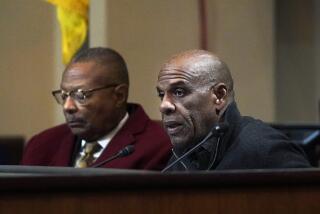Jobless Benefits Put on Slower Track
- Share via
SACRAMENTO — SACRAMENTO -- Assembly Democrats on Monday voted to provide unemployment benefits retroactively to Californians thrown out of work by Sept. 11 terrorist acts, but Republican opponents succeeded in delaying payments to the jobless for months to come.
The bill, sponsored by Gov. Gray Davis, was returned to the Senate on a party-line vote for expected routine approval of Assembly changes, the final stop before it reaches the governor for signature. The vote was 48 to 12.
But state Sen. Richard Alarcon (D-Sylmar), author of SB 2, said the Republican action in the Assembly means that about 1.15 million eligible workers will not receive payments immediately and, instead, may have to wait until mid-August.
He said the delay will affect not only Democratic labor union members but newly graduated college students and such typical Republican constituents as stock brokerage employees and airline office workers.
“The largest segment of the unemployed is within the professional white-collar classes,” Alarcon said.
The bill, an election-year priority for Davis, would extend recently increased unemployment benefits to Californians who lost their jobs between Sept. 11 and Jan. 7, regardless of whether the losses related directly or indirectly to the terrorist attacks.
Most of those were ineligible to receive the $100 weekly increase in jobless payments that took effect Jan. 7 because their unemployment occurred in 2001.
The bill originally proposed increases for only about 15,000 Californians thrown out of work by the attacks, mostly airline and tourism industry workers.
Strongly supported by the California Labor Federation, AFL-CIO, the Alarcon measure was expanded to include every qualified worker who became unemployed after Sept. 11.
“It’s a very fair bill. It’s the least we can do for those people,” Assemblyman Thomas Calderon (D-Montebello) argued during Assembly debate.
But Republicans lined up in solid opposition, warning that the state’s unemployment insurance trust fund, financed by employer taxes, is heading for insolvency just to pay the higher benefits enacted by the Legislature last year.
Passage of the retroactive payments bill would aggravate the issue, they said.
“In the space of three months, that trust fund has dropped from $6.2 billion to $4.2 billion,” said Assemblyman Bill Campbell (R-Villa Park).
As a result, employers soon will have to pay higher rates, which could cause some to go out of business, he said.
More to Read
Get the L.A. Times Politics newsletter
Deeply reported insights into legislation, politics and policy from Sacramento, Washington and beyond. In your inbox twice per week.
You may occasionally receive promotional content from the Los Angeles Times.









